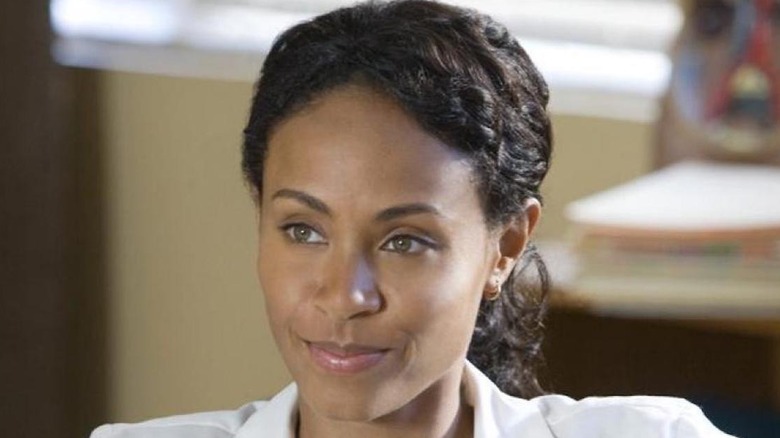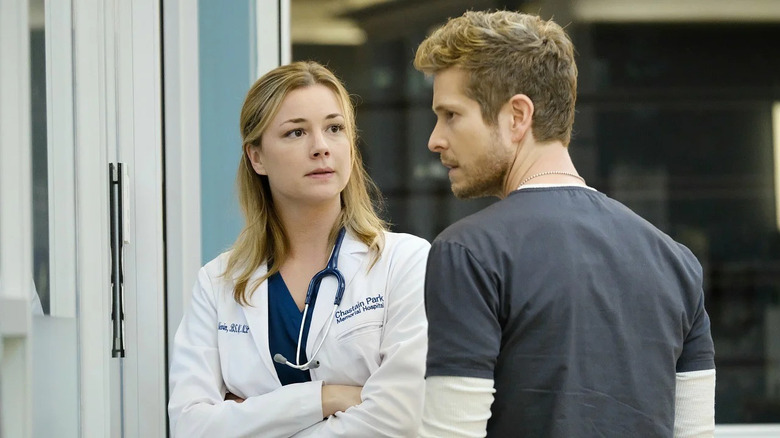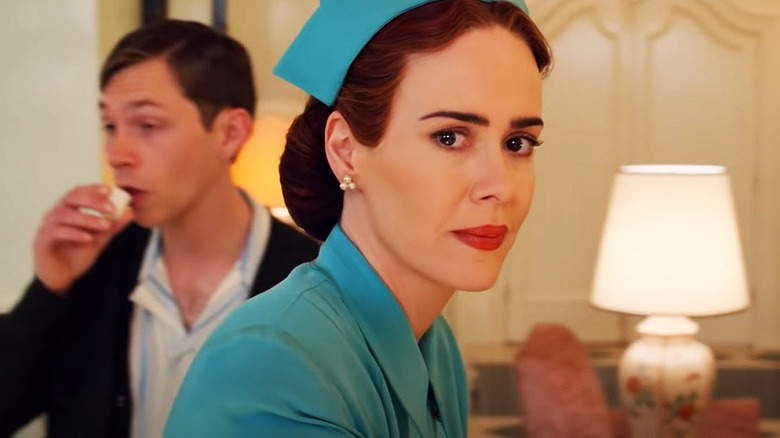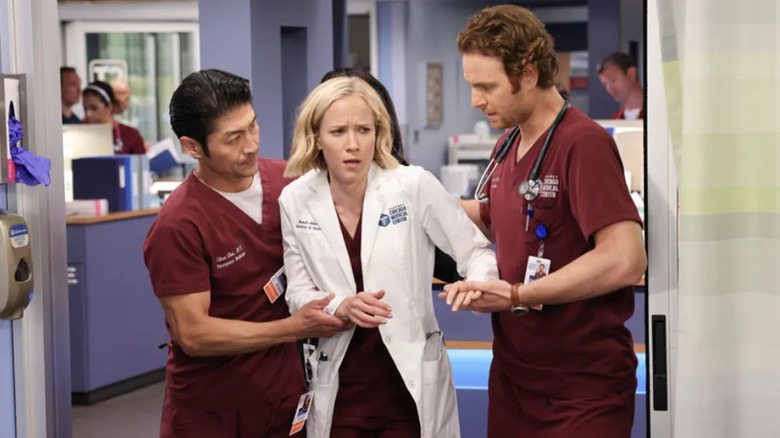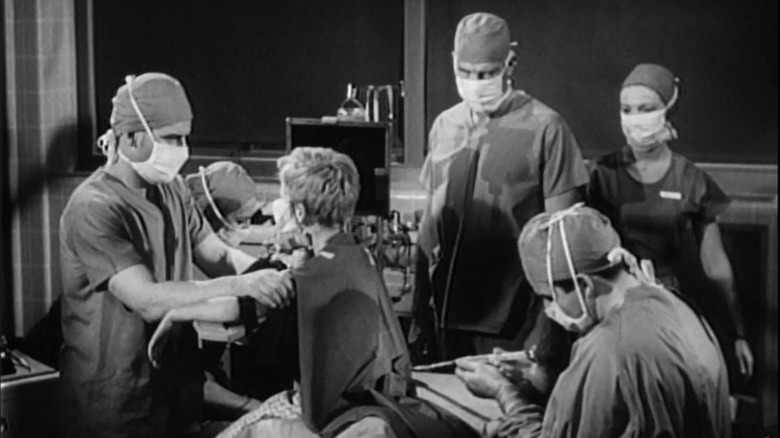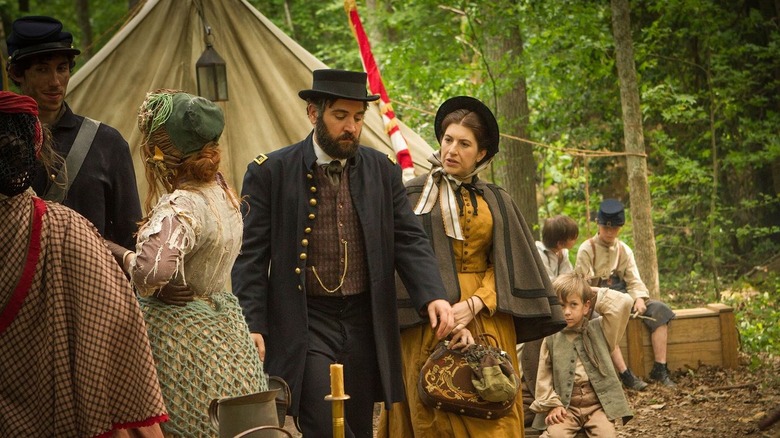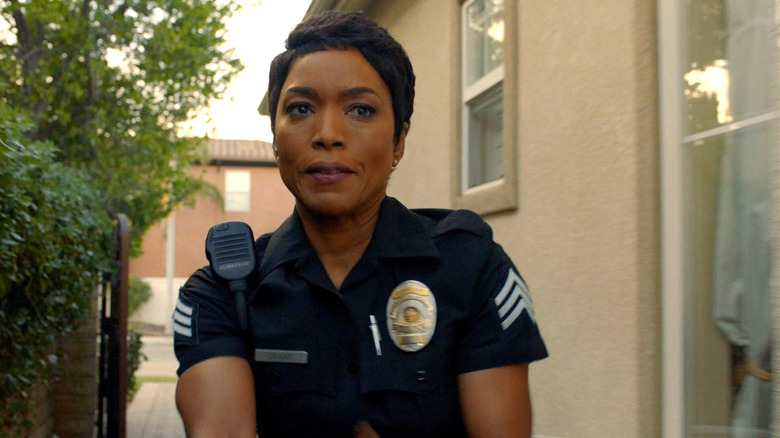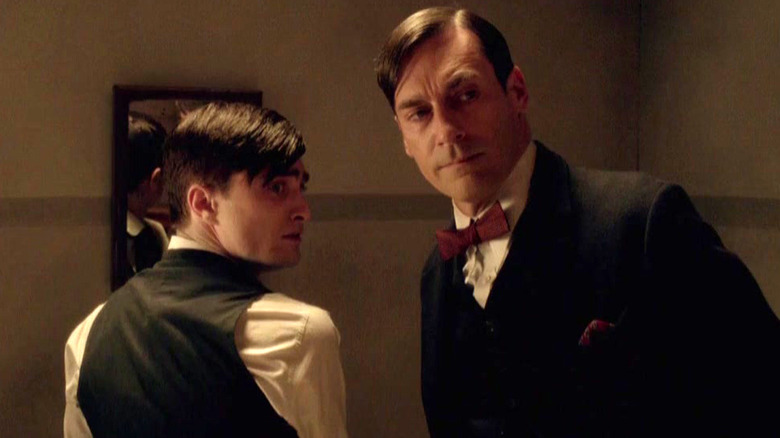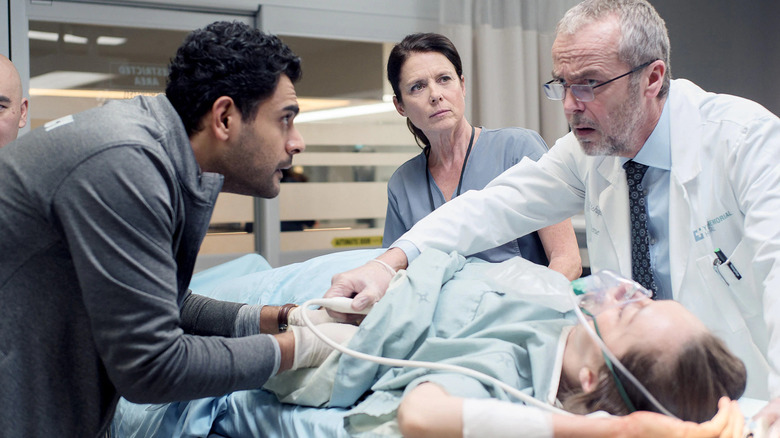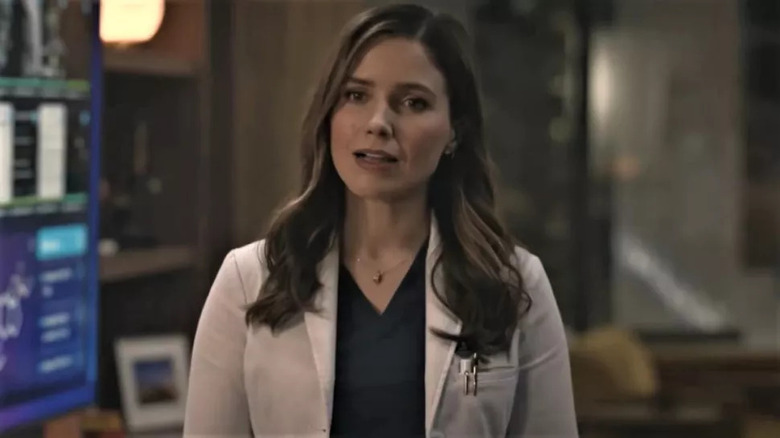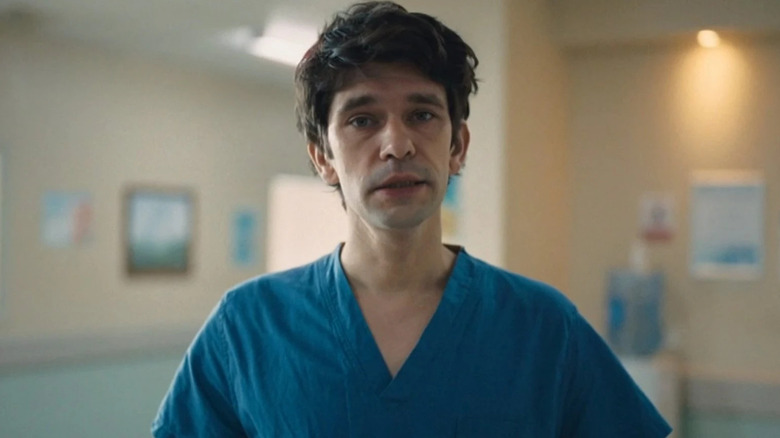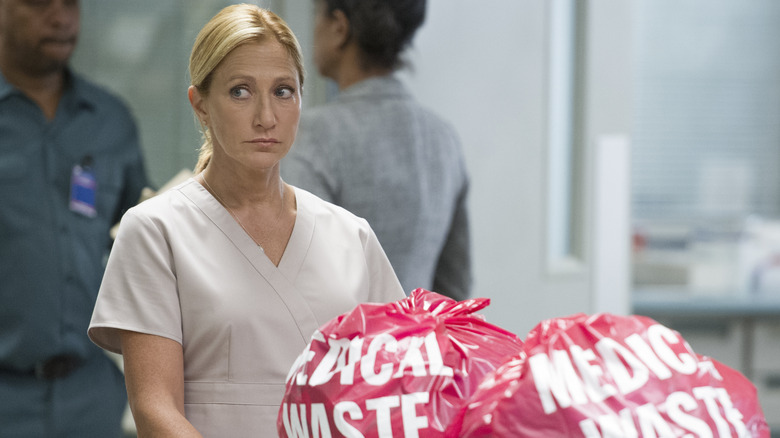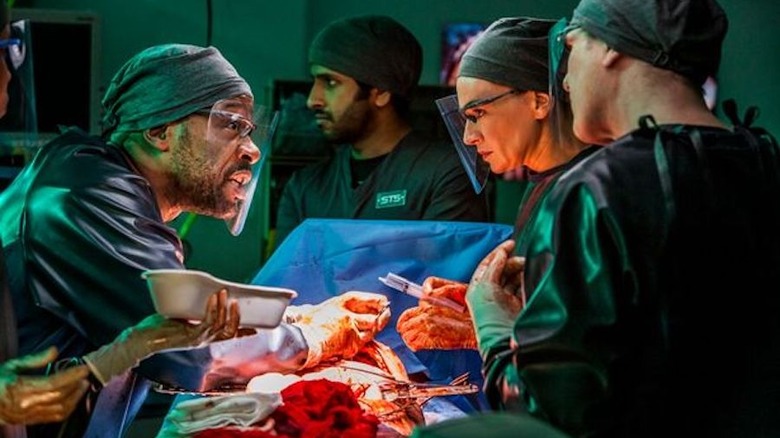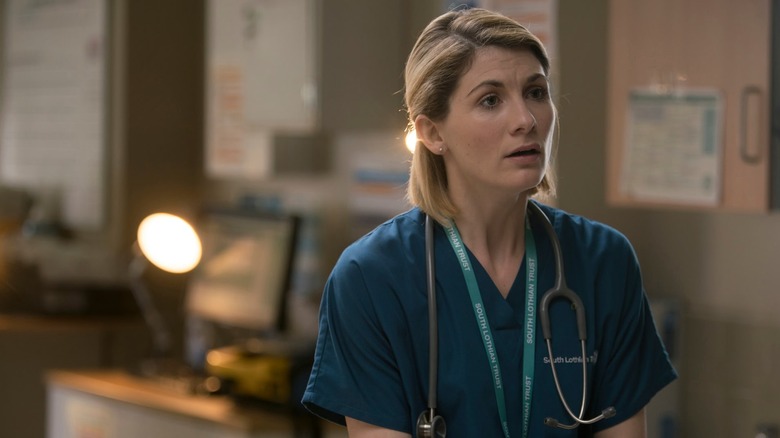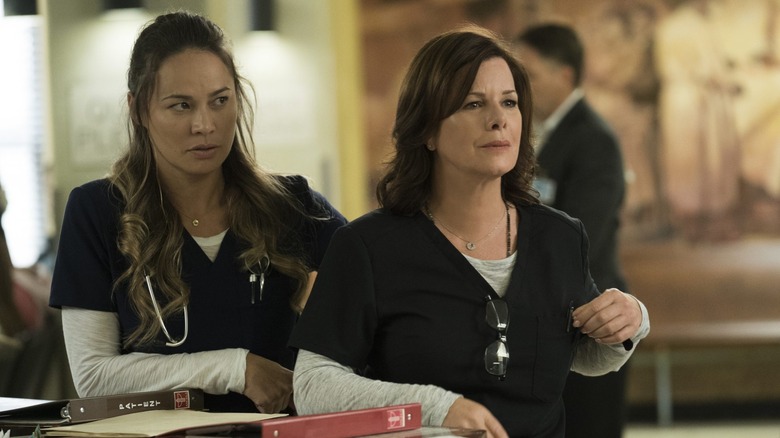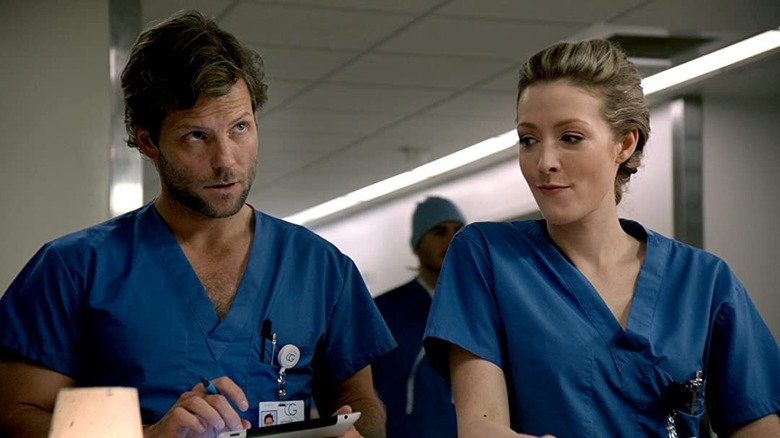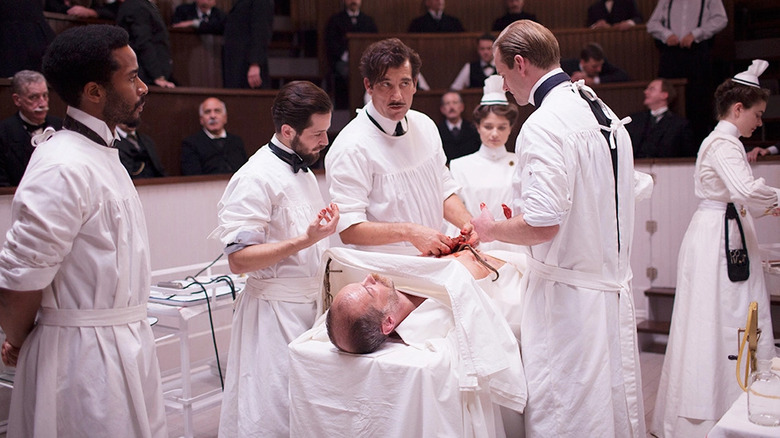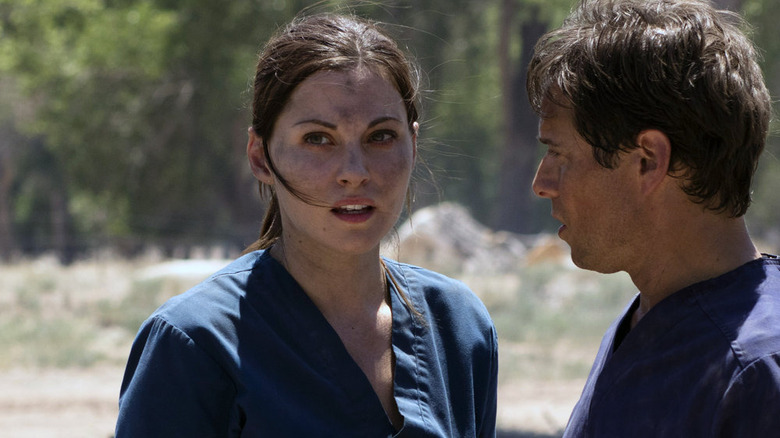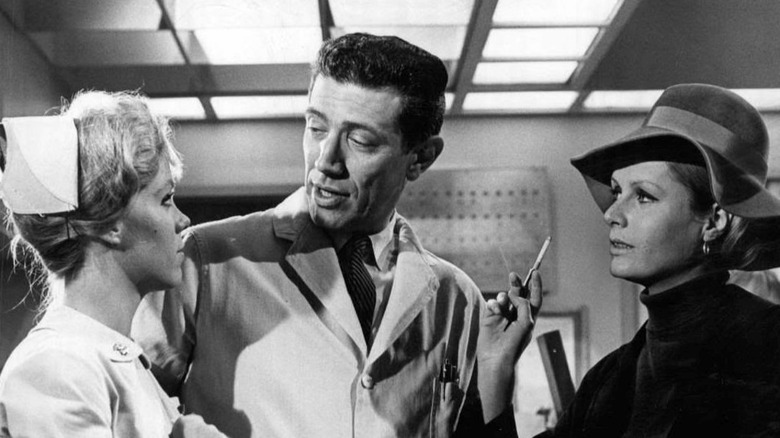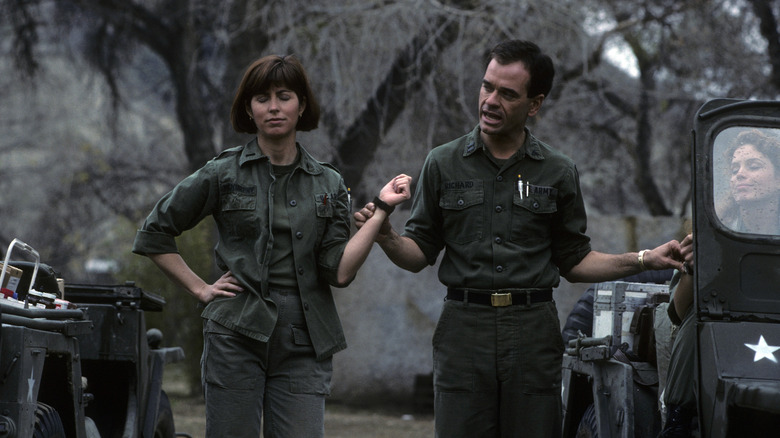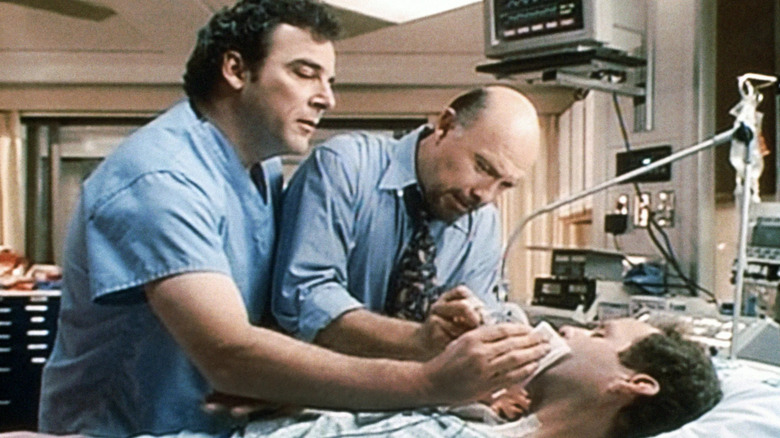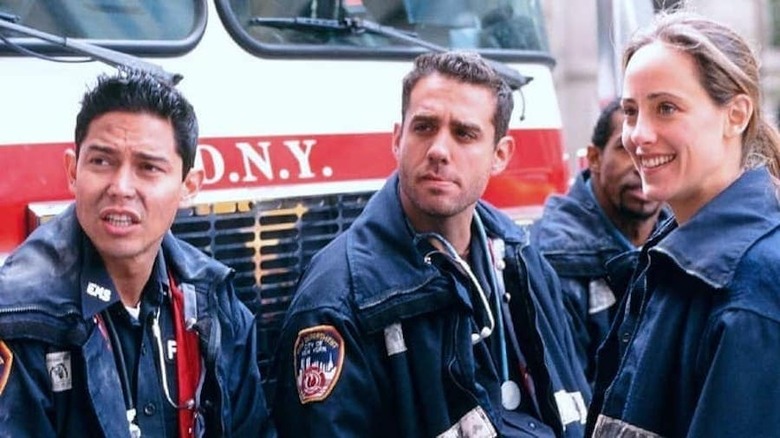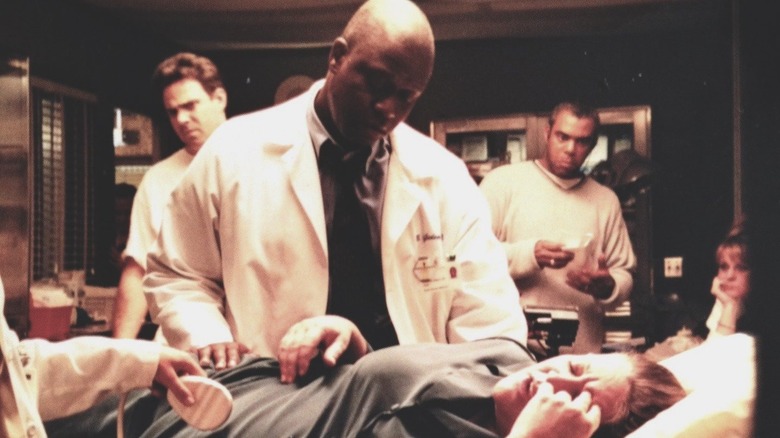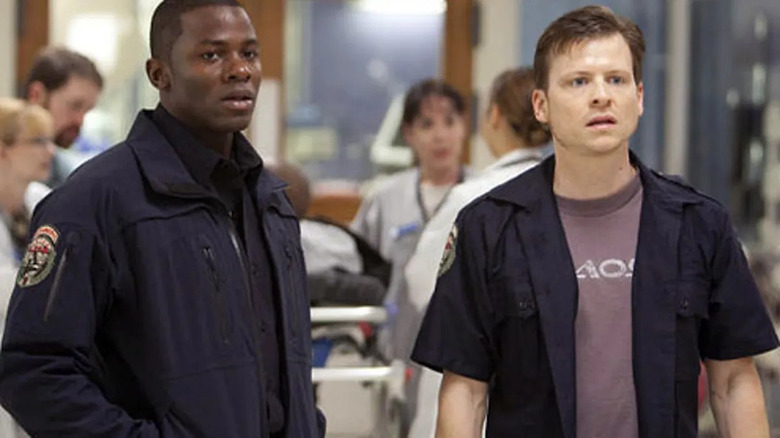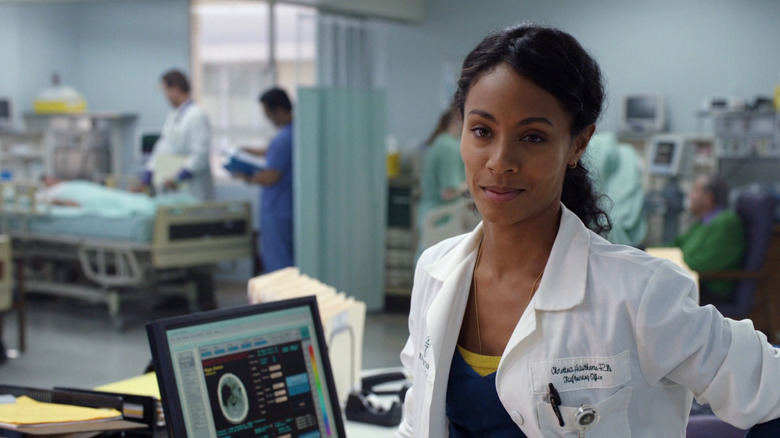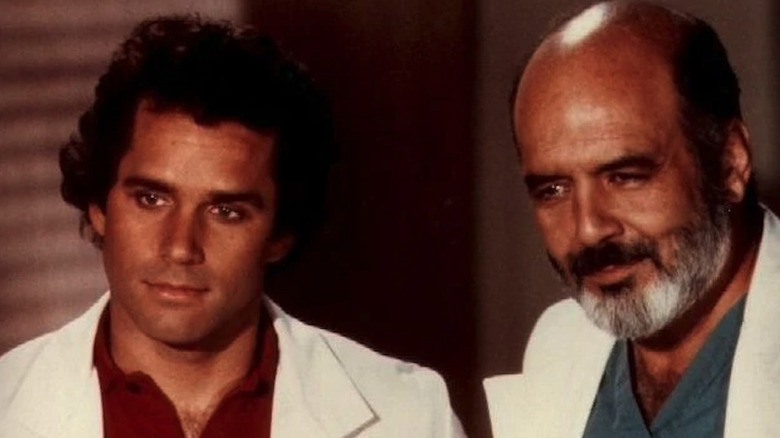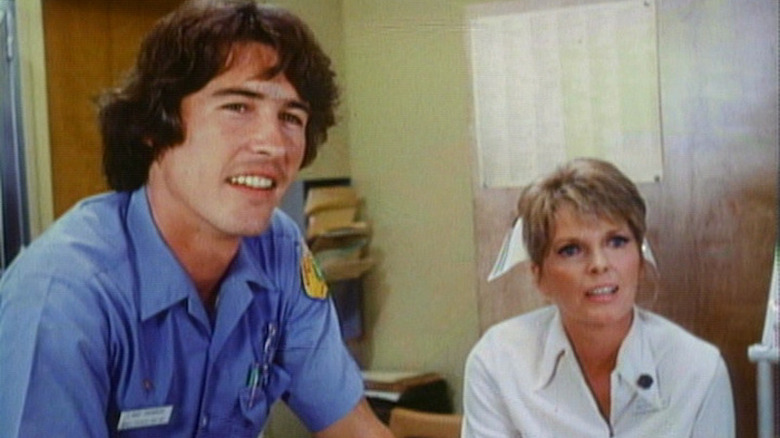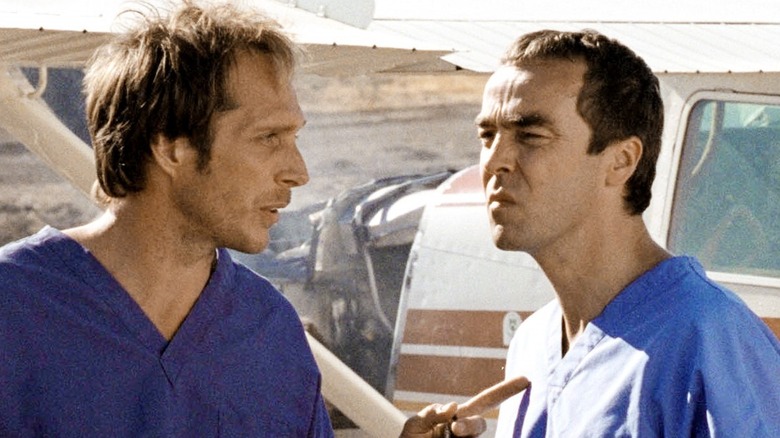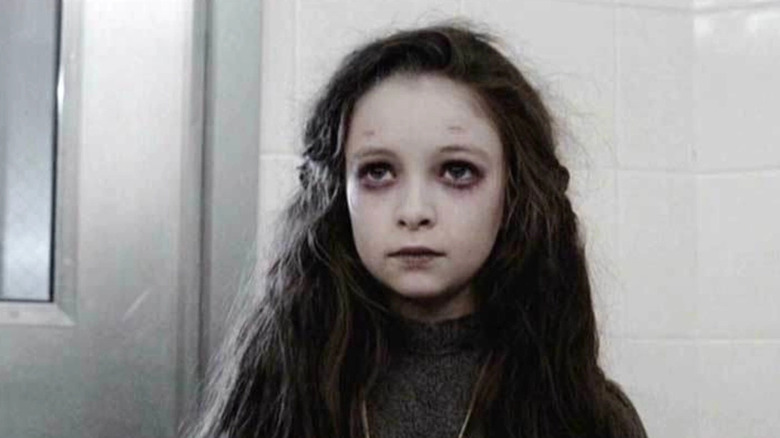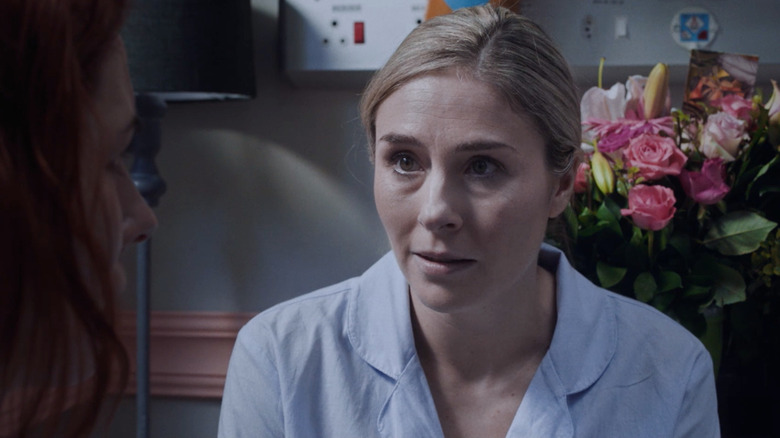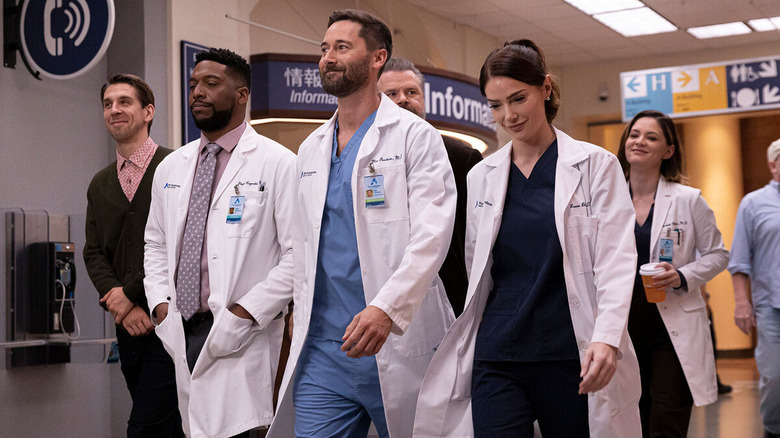30 Most Underrated Medical Shows You Need To Watch
When it comes to television drama, there isn't much that can top the action that goes on in the bowels of a hospital, where games of life and death play out with regularity. It's a place where real-life heroes are born, saving lives as patients are brought in with insidious diseases, life-threatening conditions, and catastrophic injuries. Physicians, nurses, surgeons, and staff work tirelessly to bring life back from the brink, and success is never assured. With the lives of men, women, and children hanging in the balance it's no wonder that shows about medicine have become a tried-and-true format on television, as there is never any shortage of exciting, suspenseful stories to tell.
In fact, some of the most beloved shows of all time have been medical shows: dramas, comedies, and beyond, with the likes of "ER" and "MASH" becoming all-time classics. Other celebrated greats like "Grey's Anatomy," "Nip/Tuck," and "House, M.D." have continued the exploits of brilliant medical minds out to force god's hand. But for every legendary best is an underrated gem just waiting for wider recognition. If you've seen the most famous medical series on TV, maybe you're looking for something you haven't seen to tide you over until the next great show rises. Well, you're in luck — we've found 30 underrated medical shows you need to put on your watch list.
The Resident
Well-reviewed and a hit with audiences, "The Resident" is rarely listed among the genre's best, but should probably be regarded among the likes of "ER" or "Grey's Anatomy." Debuting in 2018, it stars Matt Czuchry ("The Good Wife") and Emily VanCamp ("Falcon and the Winter Soldier"), its broader ensemble cast includes Andrew McCarthy, Malcolm-Jamal Warner, Bruce Greenwood, and Morris Chestnut.
Set at the fictional Atlanta hospital Chastain Park Memorial, the series centers on Senior Internist Conrad Hawkins, an incredibly talented doctor with a gift for diagnosis who's not afraid to be brutally honest with patients or his staff. Sometimes this means shattering their beliefs about the nobility of their work and giving them a stark reality check, which also makes him a complicated figure. The series puts a focus on his relationships with his fellow doctors, including tension with controversial surgeon Randolph Bell (Greenwood) and his romantic relationship with nurse Nic Nevin (VanCamp).
A series with a more jaded view of the state of the medical system, its unconventional tone has helped set it apart from many contemporaries.
Ratched
There have been plenty of great TV prequels to classic films on television in recent years, with "Bates Motel" and "Rings of Power" just two examples. But largely overlooked as both a prequel and medical series is "Ratched," a period story set decades before the hit 1975 film "One Flew Over the Cuckoo's Nest." An unexpected series that starred Sarah Paulson as the titular Ratched — taking over the role from Academy Award-winner Louise Fletcher — it debuted in 2020 and was never given the chance it deserved.
Taking place in the late 1940s, the series is more a dark thriller than most on this list, with a young and ambitious Nurse Mildred Ratched getting a job at a California psychiatric hospital under the auspices of learning about the pioneering field of mental health. But as the series progresses, we soon learn that there's much more to Ratched's role at the hospital than meets the eye. While she insidiously weasels her way in, we realize that her true purpose is far more sinister: In the series' early episodes it's revealed that Ratched's foster brother is a mentally unstable patient there, and is being held after committing a violent murder.
A twisted, more disturbing series than most, "Ratched" is a stunning crime thriller that provides an expansion on a classic story and tells a new tale you didn't even know you wanted to see.
Chicago Med
Part of a broader franchise of shows referred to as "One Chicago," the 2015 series "Chicago Med" was launched as a spinoff of the cop drama "Chicago P.D." But despite its good reviews and ratings, it's often written off as a more casual primetime fare, with many downplaying just how good and hard-hitting its medical stories and personal drama really are.
Every bit as fine as the best of the genre, it's much more than a standard spinoff, though one of the things it does so well is weave in the larger ongoing plot lines and characters that criss-cross the multi-series franchise. With a diverse and varied cast of doctors, nurses, and surgeons, "Chicago Med" is centered at the titular medical center that serves as the hub of activity connecting every show in "One Chicago," from the police of "Chicago PD" to the blaze battlers of "Chicago Fire."
Explosive event-based episodes also make the series an emotional rollercoaster, mixing in somber tear-jerkers with nail-biting thrills in the vein of "ER." If you want action, suspense, heart, and emotion, with episodes that run the gamut in size and scope, "Chicago Med" is where you want to be admitted.
Ben Casey
Among the many early primetime medical dramas ever to air on television was "Ben Casey," which along with "Dr. Kildare" helped cement the genre in the early '60s. But while both were wildly successful, over the decades it's mostly been "Kildare" that gets the lion's share of attention on looks back, possibly because of his more recognizable name and his more famous, more conventionally attractive star Richard Chamberlain. But "Ben Casey" is every bit as good, and just as influential.
The title character in "Ben Casey" is not the smug, savant surgeon modern viewers may be familiar with from this type of show. Instead, Casey is an idealistic, confident, but sometime naive brain surgeon who has a lot to learn. His mentor is his hospital's Chief of Neurosurgery, Dr. David Zorba, played by screen legend Sam Jaffe (whose famous films included "Ben Hur" and "Gunga Din"). A trailblazing series that helped set the tone for all who would follow, it intertwined stories of Casey's love life with intense medical issues each week, earning it plenty of acclaim and Emmy consideration.
If you want to take a look back at a show that isn't as talked about anymore but is the grandfather of all the greats, "Ben Casey" is the one.
Mercy Street
The 2016 series "Mercy Street" takes viewers over a century back in time, set in the middle of the American Civil War. Perhaps viewed more as a period piece than a hospital drama, "Mercy Street" is every bit as compelling a series centered on medicine as any set in the modern era, with a pair of nurses from opposite sides of the nation's bloodiest conflict. Unfortunately, with a mostly lesser-known cast, and released on PBS — a network not known for its primetime dramas — the series received very little attention.
But tune in and you'll find Mary Elizabeth Winstead in the role of real-life nurse and abolitionist Mary Phinney, who volunteers after the outbreak of the Civil War. Set in the Mansion House Hospital in Alexandria, Virginia — then under Union control in the otherwise Confederate South — the inexperienced Phinney is unexpectedly put in charge, putting her at odds with the Southern Nurse Anne Hastings (Tara Summers) who had previously run the facility.
Visceral and graphic, the series doesn't shy away from the brutality of America's Civil War or the horrific reality of medicine in the 1800s. Captivating thanks to its unique setting and strong performances, "Mercy Street" is a step above, while also being a bold step backward in time.
9-1-1
Not all medical shows are created equal, and there's a distinct subgenre that broadens the focus beyond a hospital to the larger world of emergency front line workers. This usually includes everything from police and firefighters to paramedics and emergency room staff. Because they focus less on medical crises, they are often overlooked and underrated, and the first up to make our list is the Angela Bassett-led series "9-1-1." Though a long-running drama, it may be overlooked as a medical show by those who strictly stick to hospital-centric series.
But with a strong cast that also includes Kenneth Choi, Aisha Hinds, Peter Krause, and Jennifer Love Hewitt, it has a prestige pedigree and talent enough to make worth watching even if you might not usually tune in for police dramas. Beyond doctors and surgeons, the series finds its stories following first responders including dispatchers, EMS, police, and beyond. But what sets it apart from most is that most of the dramatic stories told week after week are all based on true stories.
In "9-1-1" it's more than just over-the-top cataclysms and rare diseases, but the tension of ordinary disasters including car crashes, building fires, and even an earthquake. Of course, it still finds plenty of time to work in the off-duty problems of its officers, doctors, and rescuers too.
A Young Doctor's Notebook
Not all great medical series come from the United States, with many international efforts not enjoying great success when brought to American shores. Case in point is the much-overlooked limited series "A Young Doctor's Notebook," based on a series of stories by Russian author Mikhail Bulgakov. Despite featuring two global megastars — "Mad Men" veteran Jon Hamm opposite Harry Potter himself Daniel Radcliffe — the series seems to have been almost entirely forgotten after running for two seasons and eight total episodes between 2012-2013.
Radcliffe stars as wide-eyed young doctor Vladimir Bomgard, whose older self (Hamm) is reading his old diary and reliving his early days on the outskirts of society in a remote hospital. There, the young doctor must contend with primitive medical practices, an ignorant populace, and the sudden realization that surgery in reality is very different than what he learned in school. All the while, his future self acts as a quasi-spiritual guide in a somewhat surrealistic exploration of 19th century medicine.
Almost blithe in its gruesome tone, "The Young Doctor's Notebook" gives us a finely crafted, well-produced doctor-focused series that also offers up razor-sharp satire. But what makes it all the more compelling is that the stories that unfold are all inspired by real events in the life of Bulgakov, who himself was a surgeon before he turned to literature (via the Guardian).
Transplant
Another international effort, this one from the Great White North, "Transplant" is a successful medical drama in Canada. Though it normally may never have been seen in the United States, delays in production on their own series due to the global pandemic in 2020 led NBC to seek temporary replacements from foreign markets (via Deadline). While "Transplant" got a single season airing stateside, it disappeared once Covid-related delays eased, and has not aired domestically since. But if you can find it, it's more than worth the watch as a captivating series all its own.
Among the most-watched shows in Canada, the series stars Hamza Haq ("Quantico") as Dr. Bashir Hamed, a battle-weary surgeon who fled his native Syria due to the ongoing civil war. Along with his sister Amira (Sirena Gulamgaus), "Bash" as he's nicknamed arrives as a refugee, but because of a lack of official paperwork must prove himself in order to secure a residence at York Memorial Hospital. Despite his experience in emergency medicine, Hamed is routinely underestimated and overlooked, especially by the fellow doctors and surgeons at York.
With its unique starting premise, "Transplant" does more than put forward tense medical cases week after week, but also examines racism and prejudice as Hamed fights to regain his status as a respected surgeon.
Good Sam
While "The Good Doctor" gets all the accolades, there's another, underrated medical show with a similar vibe and even a similar title: "Good Sam" starring Sophia Bush and Jason Isaacs. This one has a family dynamic at play that brings its own flavor, as it centers on the titular Dr. Sam Griffith (Bush), a young, rising star doctor whose relationship with her surgeon father (Isaacs) becomes extra complicated due to some extraordinary circumstances.
In the series, the younger and less experienced Griffiths is unexpectedly put in charge of surgery at Lakeshore Sentinel Hospital when the former chief becomes incapacitated and falls into a coma. But the former boss happens to be her father, Dr. Rob Griffith, and once he's back on his feet — but not yet ready to resume his full duties — Sam is put in the unenviable position of being her father's supervisor. At the same time, she struggles with self-confidence as she is now in charge of more veteran doctors all around her.
Under-appreciated, "Good Sam" only received one year on the air, but is more than worthy of a binge watch, with strong performances and even a little wry humor too.
This is Going to Hurt
One of the more sobering dramas on this list is all the more impactful because it's based on the memoirs of its creator, TV writer Adam Kay. Before he worked in television, Kay had a career as a doctor, and chronicled his experiences into what would become the book "This Is Going to Hurt," which he eventually turned into this BBC series in 2022.
The series stars Ben Whishaw as Kay, a young doctor working in the obstetrics and gynecology ward of a busy London hospital. Overwhelmed by the mountainous caseload, Kay must also deal with the struggles of a deficient health care system. Kay and his staff are overworked and under-resourced, all of which we see affect their personal lives too. At times bleak, the seven-episode series provides a look at the stark reality of what it's like as a member of a young medical staff in England.
Though the series does have its laughs, it's definitely on the more serious side, and even features fourth-wall breaking moments as Kay and his colleagues address the very real problems faced by today's doctors.
Nurse Jackie
Though most medical shows focus on the high-level doctors, surgeons, and emergency medical professionals, our next entry is something different. Instead of a gifted doctor who dispenses genius diagnoses, "Nurse Jackie" puts the focus on the unsung heroes of the medical community, its dedicated nurses. In this case it's Jackie Peyton, a determined but personally flawed nurse at a big city hospital. It's presented as a mix of drama and comedy, and "Sopranos" star Edie Falco leads the series as the sardonic but hard-working and dedicated Nurse Jackie.
On the job, Jackie is hard-nosed and unflappable, with a dry wit and tough exterior, unwilling to take guff from just about anyone. At home she has her own struggles, with a penchant for painkillers that sometimes go a little too far. Though thought of mostly as a sardonic comedy given its level of laughs, "Nurse Jackie" is a strong drama too, punctuated by stinging social commentary on the weaknesses in the health care system. Unafraid to buck the system, Jackie herself says what we're all thinking when it fails us, and delights when it triumphs. Running for seven seasons, there's also plenty to sink your teeth into if you're looking for something new after getting through more celebrated series like "House" or "Scrubs."
Critical
While most medical shows feature a pretty standard format, with the suspenseful, life-saving stories of doctors and their patients accented by interpersonal conflict and the struggles the characters face in their off hours, some shows do things a little differently. "Critical," a British series starring Lennie James of "The Walking Dead," is one such show, with a unique format and structure that make it something truly different.
Set in a fictional hospital and focused on a team of expert trauma surgeons, each episode of "Critical" follows a single case over the span of one hour, in more or less real time, as they work to save a life on the line. Uncompromising and hard-hitting, the series never holds back with plenty of graphic medical sequences as the doctors and their staff rush into life-saving operations, always working against the clock, while there's never a guarantee that they'll succeed.
With far less of the soap opera-like affairs you'll find in many more traditional medical series, "Critical" largely eschews the personal drama. Instead, it goes right for the jugular with heart-stopping, edge-of-your-seat medical thrills and gritty surgical action.
Trust Me
In 2018, a British series titled "Trust Me" pushed the boundaries of the genre by telling the story of a disgraced doctor who starts a new life under an assumed name. With its mix of suspense thriller and procedural, with elements of a classic hero drifter story, it's something of a modern update on "The Fugitive" or "The Incredible Hulk."
Fresh off the acclaimed first season of BBC crime drama "Broadchurch," star Jodie Whittaker stars as Cath Hardacre, a nurse at a hospital in Sheffield. But when Cath decides to turn whistleblower over her facility's negligent treatment of patients, she's promptly fired and left with a ruined reputation. Seeing no options for employment, she steals the identity of her best friend, who's just left the country for New Zealand, and gets a job as a doctor in Scotland.
In a new role with little training, Cath must quickly get up to speed on how to set broken bones, perform minor surgeries, and more, all while dodging answers about her true identity. Debuting just after Whittaker was announced as the 14th Doctor on "Doctor Who," the series saw its star depart after its first season. With a new cast and story the following year, Series 2 focuses on a paralyzed military vet played by Alfred Enoch who takes up his own investigation when other patients in his hospital begin dying under mysterious circumstances.
Code Black
Though it had a run of success for a few seasons and a handful of big names in its cast, the 2015 series "Code Black" just couldn't sustain against some tough competition, and left the airwaves after three seasons. Set specifically within the confines of an emergency room, it followed the day-to-day exploits of several first year resident doctors alongside more veteran supervising physicians and specialists.
The series starred Marcia Gay Harden, Rob Lowe, Moon Bloodgood, and Luis Guzmán as part of an ensemble cast. Led by Harding as the ER's attending physician Dr. Leanne Rorish, the team of medical professionals wrestle with problems due to their hospital's lack of resources, minimal staff, and busy influx of patients in downtown Los Angeles. With everything from devastating car crashes and police shooting victims to deadly contagions, a prison riot, and an explosion on a Russian sub, "Code Black" provides pulse-pounding stories every episode.
Based on a documentary of the same name, "Code Black" accurately captures the chaotic nature of a big city emergency room, with all the pathos and emotion that you could want out of a more traditional medical drama.
Monday Mornings
Producer David E. Kelley may be best known for his work in the legal genre, with hits like "L.A. Law," "The Practice," and "Boston Legal." But he's also produced a few medical-focused shows, with "Doogie Howser, M.D." in the 1980s and "Chicago Hope" in the '90s. He returned to the world of doctors and nurses in the 2010s with the underrated "Monday Mornings," a series named for the weekly meetings where hospital staff have their performances regularly appraised.
The series starred Ving Rhames ("Mission Impossible"), Jamie Bamber ("Battlestar Galactica") and Alfred Molina ("Spider-Man: No Way Home"), and was set in the fictional Chelsea General Hospital located in Portland, Oregon. Molina plays the hospital's chief of staff Dr. Harding Hooten, who runs the weekly get-togethers where he's never shy to heap praise or criticism at his doctors.
As is typical for a David E. Kelley series, "Monday Mornings" mixes its procedural drama with sarcastic wit. Sharp dialogue, strong stories, and a diverse and charismatic cast made it stand out, and while it only received a single season in 2013, you'll come away lamenting that it didn't receive a longer run.
The Knick
Some of the polish and luster of high quality medical shows has been lost with the rise of prestige television. As studios pivoted to limited series and lavishly produced, short-run dramas, we've seen more crime dramas, thrillers, and action series, while shows about doctors haven't enjoyed quite the same attention. But when they do, they shine, including the underrated period piece "The Knick" from director Steven Soderbergh ("Ocean's Eleven") and star Clive Owen ("Children of Men").
Debuting in 2014, the series takes us back to the turn of the 20th century when doctors were making scores of medical breakthroughs and developing revolutionary surgical procedures — but using questionable ethics to do it. The action is set at the Knickerbocker Hospital in New York in 1900, where Dr. John Thackery is Chief of Surgery, who's hiding a secret habit he fights to advance medical knowledge while waging his own war against a system that gives him little funding and resources. Meanwhile Dr. Edwards (André Holland) must fight a private battle against racism and prejudice while running an underground clinic for the city's overlooked minorities.
Confronting serious issues, the series has a lot to say about the state of medicine and society in 1900, while serving as allegory for many of today's problems too. Though highly acclaimed, "The Knick" has received only modest mainstream attention, though there's been rumor of a third season for years.
The Night Shift
There are underrated shows that are beloved, and then there are underrated shows that have somehow been lost in the shuffle, all but forgotten. One of those is "Night Shift," a series that could never quite find an audience across its four turbulent seasons. Debuting as a summer series in 2014 before returning a year later as a mid-season replacement, it then went back to the summer after that. The multiple time slots may help explain why ratings could never find consistency, because viewers who did tune in loved the show.
An offbeat medical drama, "The Night Shift" was created by the dynamic due of Gabe Sachs and Jeff Judah, the two men behind cult hits like "Freaks and Geeks" and "Undeclared." This time instead of a high school or college, they set the series in a hospital emergency room, and followed a team of doctors, nurses, and technicians who worked the overnight shift. But just because most of the world is asleep doesn't mean things are quiet, with plenty of dramatic, life-or-death cases coming into the ER night after night.
A series with a mostly unknown cast, "The Night Shift" may not reinvent the formula, but it definitely deserves a resuscitation.
The Nurses
While 1960s shows like "Dr. Kildare" and "Ben Casey" helped make the medical drama what it's become, they certainly weren't the only shows in the genre in that era. In 1962, another series titled "The Nurses" moved the action beyond a single dedicated surgeon to follow a pair of nurses in the fictional New York hospital Alden General. The series followed Gail, a veteran nurse, and Liz, her impressionable young cohort, as they dealt with difficult moral and ethical problems, usually involving socially relevant issues of the day.
In its second season, "The Nurses" changed its title to "The Doctors and the Nurses," and broadened its scope to become more like the traditional medical shows we see today. No slouch itself, "The Nurses" was nominated for five Emmys during its run, all for onscreen acting performances.
But what may have caused the series to become overlooked is that the series shifted focus to melodrama and moved to a different network after its third season, becoming a daytime soap opera. In doing so, it largely ditched the doctors and its title reverted to "The Nurses." But in its first three years on the air, it was a top primetime drama that's been under-appreciated for its stirring stories and strong performances.
China Beach
When it comes to wartime medical shows, few would argue that the acclaimed 1970s series "MASH" isn't the finest ever made. But in the 1980s, another series with a similar premise had its own successful run, and featured a number of well-known names, though today you don't hear much about it. Debuting in 1988 and concluding in 1991, "China Beach" moved the action from the Korean War to the Vietnam War, and featured a broad ensemble cast that included Dana Delany ("Body of Proof"), Michael Boatman ("The Good Fight"), Robert Picardo ("Star Trek: Voyager"), and Marg Helgenberger ("CSI").
The series explores the lives of the doctors, nurses, and medical volunteers at a field hospital on My Khe beach in Vietnam at the height of the war. It was notable for being led by its women characters, and their fight to save lives while dealing with the devastating effects of the conflict. An intense series that pulled few punches, it took a cold hard look at America's involvement in Vietnam, and was never afraid to ask hard questions. At the time, it was a cutting edge drama that went places few dared to touch, and seen today, one can clearly see the influence it took from the likes of "MASH" while serving as a stepping stone to bigger '90s greats like "ER."
Chicago Hope
In the 1990s, "ER" became the hottest drama in primetime, besting even the likes of "Friends" and "Seinfeld." But while the George Clooney classic was getting the fanfare, its rival "Chicago Hope" was getting rave reviews as well. Running for six seasons, it may never have cracked the top 20 in the ratings, but it was nominated for a jaw-dropping 42 Emmy Awards, winning 7 times, including a Best Actor nod for star Mandy Patinkin.
Long before "Chicago Med," this 1996 series chronicled the life of the staff at another metro hospital in the heart of the Windy City. It was created by David E. Kelley, whose only previous medical series had been the family sitcom "Doogie Howser, M.D."; here, the prolific producer went much more dramatic for his '90s foray into hospital action, which coincidentally debuted the same week as "ER." Patinkin starred as Dr. Jeffrey Geiger, a surgeon still reeling from the death of his son at the hands of his mentally disturbed wife.
Ironically, many predicted "Chicago Hope" to be the winner of the rivalry with upstart "ER" thanks to the involvement of Kelley, then a legendary TV stalwart. While both succeeded, "Chicago Hope" continually lived in the shadow of its longer-lived cousin, putting it deep into the annals of underrated med dramas.
Third Watch
While NBC had the biggest hit of the '90s in "ER," they clearly wanted to play off their success with another medical drama, but perhaps didn't want it to just be a carbon copy of their flagship series. The result of their efforts was "Third Watch," a show that covered more than just doctors, broadening its scope to include emergency workers such as police, firefighters, and EMS, just as "9-1-1" would do nearly two decades later. Being on the same network and set in the same city, "Third Watch" even featured a crossover episode with "ER," though it never could quite match that show's success.
A controversial series that featured adult language and graphic sequences, "Third Watch" was never afraid to go dark. Set in New York City at the turn of the millennium, it faced the ultimate test after the attacks on 9/11, and it passed with flying colors: Its third season famously opened with a documentary episode that featured interviews with real members of the NYPD, NYFD, and city EMS workers, an installment that eventually took home a Peabody Award.
Later that season, the show's fictional story took the national disaster head-on, with a story that showed how the event affected the series regulars as they became conflicted about being branded national heroes. Running six seasons, it was nominated for seven Emmys.
Gideon's Crossing
Medical shows were some of the biggest hits on TV in the late '90s, and every network wanted their own. ABC struggled to find one, with "Wonderland" starring Ted Levine disappointing in 2000; in 2001, they tried again with "Gideon's Crossing." The first major role for Andre Braugher following his star turn as Detective Frank Pembleton in the acclaimed crime drama "Homicide: Life on the Streets," the series also featured future med stars Eric Dane ("Grey's Anatomy") and Rhona Mitra ("Nip/Tuck").
No ordinary hospital-based medical drama, "Gideon's Crossing" has Braugher playing Ben Gideon, the chief of experimental medicine in the oncology ward at a renowned New England teaching hospital. There, Gideon deals largely with the terminally ill, or those with otherwise untreatable diseases and conditions, and is known for his soft touch with his patients, as well as his unconventional methods. But Gideon is more than a savant doctor, as he remains haunted by the death of his wife, who in the series premiere has recently passed from cancer.
At times a difficult series to watch given the serious nature of the cases Gideon treats, it may have been a bit hard to accept for audiences in 2001, which may help explain why it was gone from the lineup after one season.
Trauma
Some medical dramas are set in emergency rooms and show a variety of cases, from major injuries and debilitating diseases to minor scrapes and common colds. Every now and then, a cataclysmic life or death crisis hits, but the NBC series "Trauma" decided to heck with all of that — why bother with the little stuff? Instead, they wanted every episode to include the big life-or-death action, and focused their series entirely on the emergency paramedics who are sent to deal with the most dangerous and deadly calls.
The premiere episode has the San Francisco-based first responders dealing with a rooftop electrocution and a deadly helicopter crash, and from there, the disasters never let up. Further stories include a hostage situation following a workplace shooting, a devastating explosion at a nearby restaurant, and an ocean rescue aboard a sinking ship.
At the same time, the show makes sure to pepper its stories with all the personal drama audiences crave, as characters like husband and father Cameron Boone (Derek Luke) deal with the ramifications of their workplace horrors on their troubled personal lives. If you're looking for a series with high stakes and adrenaline-pumping action, "Trauma" is for you.
Hawthorne
The 2010s saw an increase in high-class television series starring big-screen talent. The decade led off with the TNT medical comedy-drama "Hawthorne," starring Jada Pinkett Smith. The former "Matrix" actor starred as the titular Christina Hawthorne, the Chief Nursing Officer at Richmond Trinity Hospital. Produced by former "The Shield" producer Glen Mazzara fresh off his TV adaptation of "Crash," the series saw Pinkett's Hawthorne pushing back on the system in a less-than-traditional series.
Sometimes stylized as "HawthoRNe" to denote the focus on nurses, the series follows Smith's title character as she fights not just to save lives, but to protect her tireless staff who seem always under-appreciated. Forced to fight the hospital administrators and sometimes even her own doctors to get her staff the respect they deserve, Hawthorne fights a seesaw battle that comes to a head in Season 2 as Richmond Trinity deals with serious financial troubles, while her own career sits at a crossroads.
Despite compelling cast of characters and a strong ongoing story, the series never could compete in a crowded landscape of medical dramas, and rarely got much recognition. If you're looking for something new that had a decent run, though, "Hawthorne" delivers.
Trapper John, M.D.
Throughout the 1970s, the medical dramedy "MASH" was consistently one of the biggest hits on TV. And for good reason, as it deftly blended elements of medical procedural, situational comedy, and grim war story. Though set in the Korean War of the 1950s, it was all an allegory for the then-current Vietnam War, and as such was able to lay out some serious social commentary on controversial issues. But while the series has gone on to be legendary, it also had a sorely underrated spinoff, "Trapper John, M.D."
Spun out of the goofball title character played by Wayne Rogers in the first three seasons of "MASH," the series moves the action to the 'present day' of 1979, where the veteran Vietnam medic has gone to work at the San Francisco Memorial Hospital as Chief of Surgery. Now an older, wiser man, Trapper (now played by Pernell Roberts) is joined by young doctor George Alonzo Gates (Gregory Harrison), and together they work to save lives and deal with the problems that come from working within the rigid medical system.
Despite being mostly overlooked by modern audiences, "Trapper John, M.D." had a long and successful seven-season run. It may not have been the only "MASH" spinoff, but it's definitely the best, with a different tone and feel, while still providing all the heavy medical stories you could ask for.
Emergency!
21st century dramas like "9-1-1" and "Third Watch" cover a wide variety of frontline emergency workers — including firefighters, police officers, and medical personnel — all while standing on the shoulders of a giant: the 1971 series "Emergency!" More of an action-adventure than most medical shows of the era, it was a trailblazer for the genre, produced by the team that had previous success with crime shows like "Dragnet" and "Adam 12."
Released in an era when paramedics and ambulances were beginning to play a larger part in live-saving situations, "Emergency!" made the bold move to combine high-stakes hospital drama with fast-paced action, to become something fresh and inventive. Some even believe that it had an impact on the expansion of EMS services across the country, as the show's popularity helped bring attention to a relatively new and less heralded profession, and making it seem exciting and heroic.
Set in Los Angeles, the series followed the men and women of Squad 51, a rescue team called out to a variety of terrifying situations. The show saw emergencies of all kinds, ranging from heart attacks and strokes to deadly home accidents and victims trapped in burning buildings. Though it might feel dated by today's standards, "Emergency!" helped set the standard that many of today's best shows in the genre still follow.
MDs
If you're looking for underrated medical shows from the early 2000s, you'll find many of them from ABC, who struggled to find success in the genre, at least in terms of ratings. But in addition to the 2001 series "Gideon's Crossing," they turned out another great but short-lived show just a year later titled "MDs," starring William Fichtner ("The Dark Knight"), Jane Lynch ("Glee") and John Hannah ("The Mummy").
In the series, Fichtner and Hannah play Drs. Bruce Kellerman and Robert Dalgety, a pair of hotshot surgeons who team up to take on the corrupt health care system, flouting the rules and doing things their own way to save lives. This puts them on the bad side of the hospital's penny-pinching administrators Shelly Pangborn (Leslie Stefanson) and Frank Coones (Robert Joy) — and as they try to work outside the rules, they're also dealing with problems of their own, as Kellerman must face a bitter ex-wife seeking custody of his son, and Dalgety deals with the ramifications of his repeated dalliances with members of the staff.
Though the series was plagued by sagging ratings that led to its cancellation, the show is all about its fine cast, who give sterling performances. As Kellerman and Dalgety go to comically extreme lengths to give their patients the best care they can, outlets like Variety likened the series to a modern update on "MASH."
Kingdom Hospital
If you're looking for something truly different, there's one truly underrated option that takes you on a journey far from the beaten path: the horror series "Kingdom Hospital." Inspired by the Danish supernatural series from celebrated film director Lars Von Trier titled "The Kingdom," legendary author Stephen King decided to bring the concept stateside, writing many of the stories himself while director Craig Baxley helmed all 13 episodes.
An eerie and atmospheric procedural, "Kingdom Hospital" explores the unsettling goings-on at the eponymous hospital in Lewiston, Maine. Built on the site of a Civil War-era factory fire that took dozens of young lives, the halls of the hospital are now stalked by the spirit of Mary (Jodelle Ferland), one its victims, and her pet anteater demon. A cast of eccentric characters includes the bitter Dr. Stegman (Bruce Davison), Dr. Jesse James (Ed Begley, Jr.) – the member of an underground society called the Keepers — and an ambitious young surgeon named Dr. Hook (Andrew McCarthy), who attends to the likes of hypochondriac psychic patient Sally Kruse (Diane Ladd).
Though it's not the only paranormal hospital-based drama, the involvement of Stephen King helps it edge out the 2001 series "All Souls" as our lone fantasy pick.
Inconceivable
When we think of typical medical dramas, we usually contemplate shows like "ER," "House M.D.," or "Grey's Anatomy," shows set in a large fictional hospital that cover all kinds of cases. From small bumps and bruises to deadly diseases, fatal accidents, and serious surgeries, the wide array of situations covered can help add variety, but on rare occasion, a series will narrow its focus to a very specific field of medicine — for example, "Inconceivable."
Set in a fictional fertility clinic, the series is centered on the men and women who attempt to bring new life into the world for couples struggling to have their own children. Ming-Na Wen ("ER," "The Mandalorian") stars as the clinic's founder Rachel Lu, while Angie Harmon ("Law and Order") plays incoming partner Dr. Campbell. Other leads include future "Justified" star Joelle Carter as Patrice, one of the clinic's many nurses, and four-time Emmy Award-winner Alfre Woodard as resident psychologist Lydia Crawford. Clashing personalities and troubled relationships among them complicate their immaculate goal: to help women conceive.
Premiering in 2005, the series was criminally under-viewed, pulled before the entire run of nine episodes even aired, which is nothing less than a travesty, particularly given its fine cast.
New Amsterdam
Not to be confused with the 2008 drama of the same name centered on an immortal Dutchman turned NYPD detective, the 2018 medical series "New Amsterdam" saw its final season debut in 2022. Part of the sub-genre of medical shows to focus on a beleaguered hospital and a headstrong staff who are looking to reform a broken system, it stars Ryan Eggold ("The Blacklist") as incoming medical director at the New Amsterdam Medical Center, Dr. Max Goodwin. He's supported by "Doctor Who" alum Freema Agyeman as Dr. Helen Sharpe, who heads up the oncology and hematology department, and cardiovascular surgeon Dr. Floyd Reynolds, played by "Crash" star Jocko Sims.
An underdog story, "New Amsterdam" sees a weary staff skeptical when the zealous, confident, and over-achieving Dr. Goodwin arrives with promises of turning things around. But with a fresh spark and a lot of hard work, Goodwin inspires his team to do just that, revitalizing America's oldest hospital and turning it from an underfunded old ward into a cutting edge facility at the forefront of medicine.
Inspired by the true story of Bellevue Hospital in New York City, "New Amsterdam" was pulled from the pages of Dr. Eric Manheimer's memoir, "Twelve Patients: Life and Death at Bellevue Hospital."
